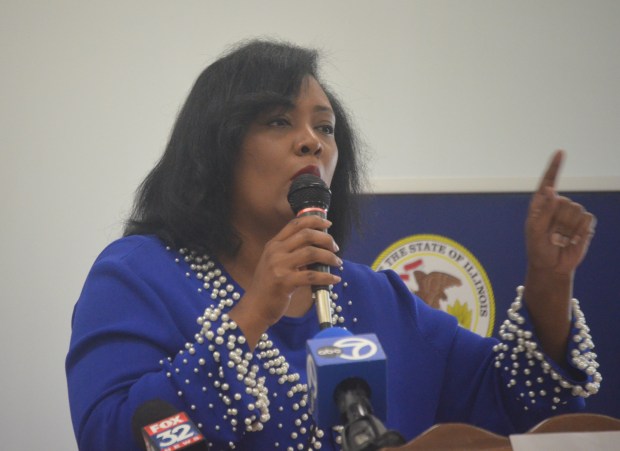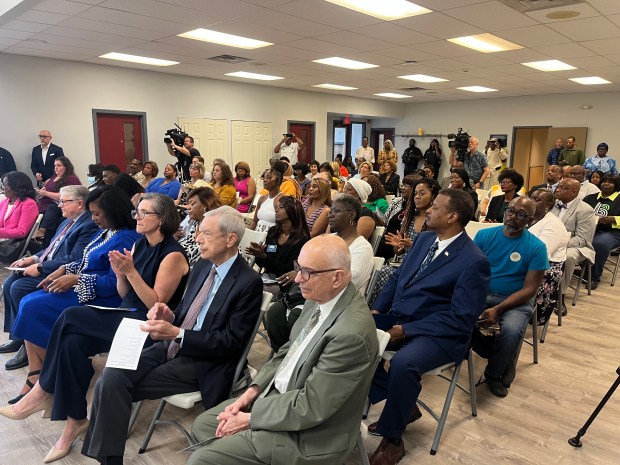The official name of the Circuit Court of Cook County’s new project is the Restorative Justice Community Court Center.
But Chief Judge Timothy Evans has a simpler name for it.
“It’s a second-chance court,” he said Monday. “It’s for young people who made a mistake, but we’re catching it early so that we can turn their lives around.”
Evans spoke to more than 100 people at the newest restorative court in Sauk Village. After opening up similar court in North Lawndale, Avondale and Englewood in Chicago, the concept is now in the south suburbs.
Evans said he wants to open three similar courts in 2025 but did not disclose the locations for them.
For now, Sauk Village is celebrating this court at 2700 Kalvelage Drive.
Sauk Village Mayor Derrick Burgess instructed the people in the crowd to turn around and look at how many people attended.
“That’s impressive,” he said. “It shows how much we need this. People are proud of this and I’m just overjoyed to see that this many people are involved in the community and want to make sure that this will impact not just Sauk Village but it will impact the whole south suburbs.”
Cook County Board member Donna Miller of the 6th District said the first three courts have been successful.
“Aside from being a Cook County commissioner, I’m a mom,” she said. “This is something near and dear to all parents because people in our community are growing up with trauma.
“We are a model throughout the entire country for restorative justice.”
County officials say Restorative Justice Community Courts assist young adults, ages 18-26-years-old charged with nonviolent felony or misdemeanor crimes reintegrate into their communities.
The courts resolve conflict through restorative conferences and peace circles involving participants, victims, family members, friends, others affected by the crime and the community.
The Peace Circle process used in the courts attempts a repair of harm agreement between the participant and community members.
The participant agrees to complete certain tasks, such as perform an act of community service, write a letter of reflection, obtain a high school equivalency diploma and/or undergo substance abuse treatment. If the participant successfully completes all the tasks set out in the agreement, his or her case will be dismissed and the offense expunged.
Victims, however, are not required to participate. But if they choose, they may directly address the participant to express how they were hurt and what they need to heal from the crime.
For a case to be eligible for the court, the victim of the crime must agree to participate in the process.
The person charged also must be age 18 to 26, charged with a nonviolent felony or misdemeanor, live, work or worship in one of the neighborhoods which has a community court, have a nonviolent criminal history and accept responsibility for the harm caused.
First Assistant State’s Attorney Risa Lanier said the program’s graduation rate is more than 80% and the recidivism rate is more than 50% lower than people who don’t go through the program.
She said the program has its critics.
“People tell us that we need traditional prosecution — you know how they act about all of this,” Lanier said. “They don’t like that we do things that don’t line up with what they think we should do.
“But when we do, we produce results like this, that strengthen our communities and give them the resources that we need.”
Lanier said State’s Attorney Kim Foxx had been in the corner of this project since the first court opened in 2017. Lanier said she was glad to hear more courts are coming.
“It’s important that we expand these programs beyond the city of Chicago,” she said. “The same needs that we have in the city we also see all around Cook County.”

Judge Ieshia Gray will run the Sauk Village court and she said she can’t wait to get started.
“I am beyond ecstatic about the work that we will do here in the south suburbs,” she said. “Today is a day that will be marked down in history for Cook County. We have brought restorative justice to the south suburbs.”
She said crime does not just affect victims, it also affects families and the community.
“This is really a call to action,” Gray said. “We have all been given an assignment. We have the assignment to transform the lives of young people who walk through those doors.”
Jeff Vorva is a freelance reporter for the Daily Southtown.



